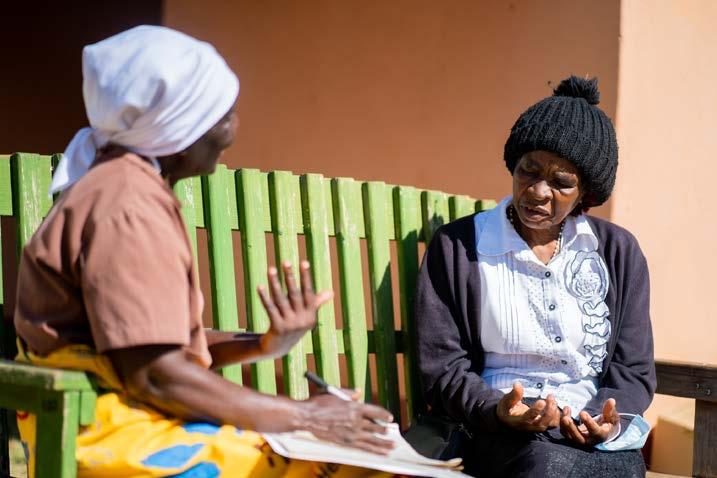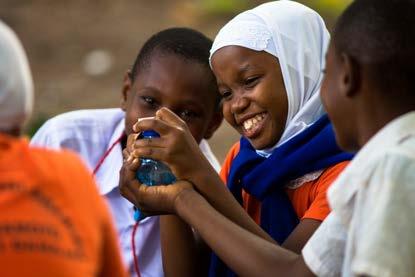
6 minute read
Normalizing Philanthropic Equity through AVFund’s Open Application System
In September, we launched our third grantmaking round and piloted our open application system. This system aims to diversify our portfolio beyond the referral process used in our first two rounds and provide more opportunities for applicants to showcase their work and impact earlier in the process - while being relatively short and mobile-accessible to make the process less burdensome for African visionaries. Since its launch, the application has been viewed over 4,000 views and generated 879 applications.
The development of this system was influenced by our partners' fundraising experiences, which highlighted the lack of transparency in process and criteria and the overall inequity of referral and invitation-only systems. For the organizations we spoke with, a typical funding application journey consists of restricted or program-specific funds and does not support a wide range of organizational sizes and stages. A finalist from our third round commented,
- Rashid Mwinyi, Executive Director, Pamoja Youth Initiative.
An open application system connects us to more promising innovators with the skills, and expertise Africa needs for long-term change. We are pleased to have met over 400 local organizations beyond our usual referral networks and expanded our geographical reach this year. We plan to share this expanded pipeline with our network of funders in 2023 and are excited to improve the system to be more responsive, accessible, and shareable next year. With support from our partners and funders, we believe that an open application system will be instrumental in promoting an equitable funding landscape that amplifies the voice, power, and visibility of African social change leaders.
Lessons Learned from our Open Application System
By Aisha Onsando, Portfolio Manager
We received 849 applications, and we were only able to make ten grants. That means there were 839 incredible, innovative, and impactful organizations that we could not support this time that deserve to be well-funded for their transformative work. That has given us at the Fund a moment for deep reflection. These are the lessons we have learned from our open application system.
Lesson number one: The funding desert for African-led organizations is deeper and wider than we ever imagined.
When you set up a water point in a desert, you'll learn much more about the desert than you ever did before because people will come to drink from corners you've never seen before. As a sector-agnostic funder, AVFund has the unique privilege of seeing and understanding African development's funding desert holistically. We're seeing more than just the climate, health, or technology corner. We're seeing the volume of need from every direction of the entire ecosystem, even the quiet corners that we would assume are thriving, or the hidden corners that we didn't know existed.
Our biggest takeaway is that most, if not all, African organizations go through seasons of severe funding drought, and the cause is the often-shifting sectoral priorities of funders and the global philanthropic agenda. Today, technology-focused organizations may thrive. Tomorrow, climate resilience projects. All the while, the sustainability of organizations in other sectors is threatened, and their progress slowed by a lack of critical resources.
This leads to lesson number two: It's not that African organizations cannot grow. African organizations are not allowed to grow.
A fundamental flaw in the funding ecosystem is that a lack of resources prevents organizations from validating their impact models at scale. African nonprofits' slower growth trajectory is not for the lack of interest, it's not for the lack of problems to solve, and it's not for the lack of talented leaders or capable fundraisers. So many organizations experience a vicious cycle where they have had large budgets and now operate on contracted budgets and are misjudged by funders as unscalable, incompetent, or inadequate in one way or another.
In reality, these organizations are doing incredible things with minimal resources. They are grappling with being left behind and fighting against all odds to remain sustainable because they cannot let their communities down. We have learned that, as funders, we need to reconsider how we serve organizations that aren't on a growth trajectory.

Lastly, and also closely connected, is lesson number three: the funder community is overly obsessed with startup culture, and even we have fallen into this trap.
One of our funding criteria is that an organization has to exist for three or more years, assuming that early growth stage organizations need the catalytic funding that we provide most. In reality, that was the easiest hurdle for most organizations to clear while applying for a grant because they've existed for 5, 10, sometimes 15 years. Hundreds if not thousands of organizations across Africa are mature, seasoned, and experienced, yet they are still stuck in a "startup phase" because their budget and organizational sizes are slow to grow.
As funders, we often fall into the trap of wanting to support early-stage ideas. Perhaps it's because incubating the next big "unicorn" is exciting. Perhaps it's easier to design and build something new than to understand what has come before. At AVFund, we want to reconsider how to make more space for mature organizations to feel valued and supported. We want to create new grantmaking solutions that are genuinely inclusive and that look at the field as what it is now rather than what we want it to be.
One thing that makes me most proud to work at the African Visionary Fund is our fearlessness at the idea of experimentation. We are fearless in exploring new approaches, and the feedback from our partners drives us to do more, think bigger, and work harder to help change the systems that harm development in Africa. We are committed to constant improvement—after all, the only alternative would be to sit back and accept the status quo. For us, that is simply not an option.







